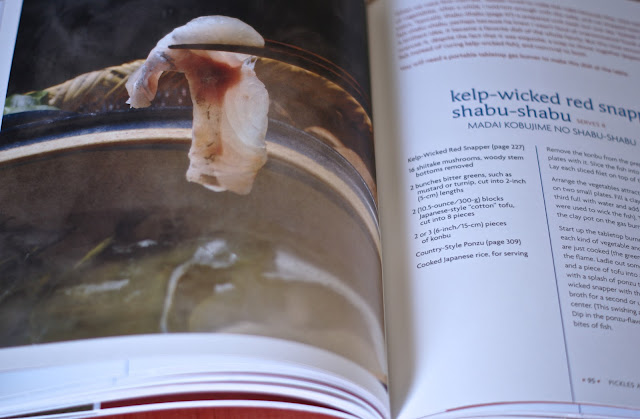Since my Miyajima posts won't be ready for a bit (apparently I took a lot of photos), I decided to quickly wrap up this cookbook review that has been sitting in my box, half-finished, for far too long. It may be too late to order in time for Christmas, unless you're a lucky reader in the States with access to Amazon's two day shipping and a fully functioning post office. In that case, you should probably just open another web page and order this cookbook before we continue any farther. It's that good.
I call it a cookbook, but Nancy Singleton Hachisu's Japanese Farm Food is more than that. Toss in some old, Japanese farming techniques; discussions of antique furniture; the mixing of Japanese and American families; appreciating the seasons through food; how Shinto beliefs influence the family's life and traditions; the tension between history and modernity; and, yes, delicious recipes; and what we have here is a diary/theology/family tree/travelogue kind of cookbook. Japanese Farm Food is even a work of art, with its exquisitely bound cover and gorgeous photography stuffing the pages. When it first arrived in the mail, I couldn't put it down for days.
Most of the recipes in Japanese Farm Food are almost laughably simple, using three to six ingredients, at most. This is, to me, the genius of traditional, Japanese cooking. The individual flavors added to a dish can be appreciated, while enjoying the flavor of the dish as a whole. Nothing is overwhelmed or too strong...nuance can be thoroughly savored. I'm excited to make the cabbage and yuzu dish (pictured above) to go with this evening's meal!
There is an excellent section on fish, with discussions about sashimi, crab, salmon, and clams. However, as this is a book about farm food in Japan, most of the recipes are unapologetically cheap to recreate, with many dishes hinging on vegetables. Other Japanese classics such as curry rice, teriyaki chicken, and udon have also been included. Mmmmmm...curry rice!
Hachisu also talks about how her husband revived the family business, returning to time-honored farming techniques that are disappearing from Japan. Their 80-year-old family farm house is essentially the most important member of the family, sheltering and watching over the mixing of generations, cultures, and culinary traditions. Some tension is apparent as Hachisu muses over her life as it has evolved in Japan, which I appreciate. It can be hard to find the balance between having a good attitude and also admitting that this living overseas thing is sometimes flat-out miserable. I'm glad she doesn't gloss over her struggles.
One of my favorite sections is visual references for cooking techniques. That's how egg is added on top of katsudon!
There is also an excellent reference section in the back for sourcing ingredients when back in the States. Thank-goodness, because otherwise, I'm going to have to plant a yuzu tree in my backyard once we move to the East Coast. There are some foods I can no longer live without!
I love getting to peek into Hachisu's family as I flip through the gorgeous pages of this cookbook. Her purist farmer husband, her lively boys, her hard-working mother-in-law, and her happy English students are all fascinating characters within this Japanese cooking story, and their stories are woven throughout. Hachisu reminds me that no matter how long one lives anywhere, there is always more to learn.
Japanese Farm Food, by Nancy Singleton Hachisu, can be purchased on Amazon. Thanks to a friend who found this book and told me about it.
Disclaimer: I do my best to make sure all my information is accurate. However, details may change or I may just be flat-out wrong. Please let me know if something needs a correction. Thank-you!



















No comments:
Post a Comment